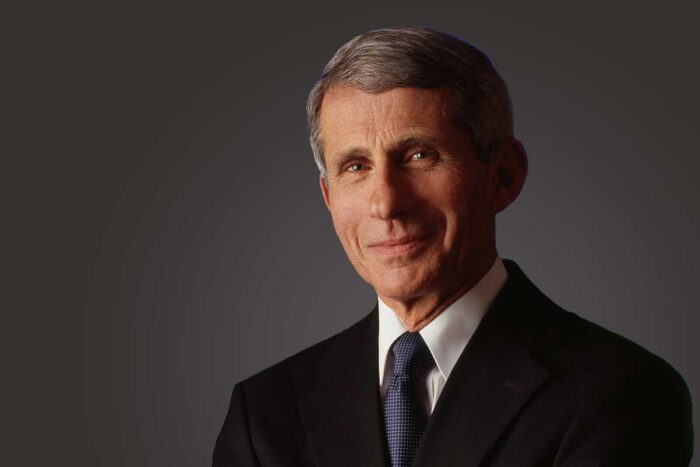Fauci to speak at WashU Medicine Commencement
Nation’s top infectious diseases expert for decades to address graduating medical students
 NIAID
NIAIDAnthony S. Fauci, MD, the recently retired director of the National Institute of Allergy and Infectious Diseases of the National Institutes of Health (NIH) and a medical adviser to seven U.S. presidents, will address graduating MD and MD/PhD students at Washington University School of Medicine in St. Louis at their Commencement on May 15.
Famed infectious diseases expert Anthony S. Fauci, MD, the recently retired director of the National Institute of Allergy and Infectious Diseases (NIAID) of the National Institutes of Health (NIH) and a medical adviser to seven U.S. presidents, will address graduating MD and MD/PhD students at Washington University School of Medicine in St. Louis on May 15, when the new doctors receive their diplomas.
Fauci’s role as graduation speaker was announced by David H. Perlmutter, MD, executive vice chancellor for medical affairs, the George and Carol Bauer Dean of the School of Medicine and the Spencer T. and Ann W. Olin Distinguished Professor.
“For almost 40 years, Anthony Fauci served as NIAID director, making seminal contributions in infectious disease and immunology research and to public health, most recently through his work to inform the public about COVID-19,” Perlmutter said. “His leadership in testing and developing treatments and vaccines has saved countless lives in the United States and around the world. He is also internationally recognized for his heroic role in confronting the HIV/AIDS epidemic, and for work that underpins our understanding of how HIV destroys the body’s defenses and makes people susceptible to deadly infections. He was instrumental in developing treatments that enable people with HIV to live long and active lives. He is the quintessential role model for physician-scientists and exemplifies all the virtues that science has contributed to improving health in our society. We are honored that he will share his wisdom with our school and our graduates on this special day.”
Like Fauci, the graduating class of new physicians he will address has gone through experiences that none expected the last few years as they trained during the height of the pandemic.
“Our Class of 2023 represents the end of a remarkable era in the training of new physicians as the school fully transitions to the Gateway Curriculum that many in this class generously helped inform,” said Eva Aagaard, MD, senior associate dean for education and the Carol B. and Jerome T. Loeb Professor of Medical Education. “And their training was anything but normal because of the pandemic and how it altered virtually every aspect of their education. We’re very proud of our graduates for sticking it out, and we’re extremely happy that Dr. Fauci will share this day and his insights with them.”
In January 2021, Fauci took time from his frenetic schedule to speak about the COVID-19 pandemic as part of Washington University Department of Medicine’s virtual, weekly Grand Rounds. Several thousand people from the university and the general public watched his live, online talk, in which he highlighted the considerable challenges of the pandemic but also emphasized the hope spurred by the distribution of effective vaccines.
Fauci served as NIAID director from 1984 through this past December and oversaw an extensive research portfolio on domestic and global health issues. The COVID-19 pandemic, however, presented him with perhaps the most formidable challenge of his career. He became the widely recognized face of public health as he worked to stem the spread of the virus and accelerate development of lifesaving vaccines and therapies.
At NIAID, Fauci oversaw the institute’s basic and applied research to prevent, diagnose and treat infectious diseases such as HIV/AIDS, respiratory infections, tuberculosis and malaria, as well as emerging diseases such as Ebola, Zika and COVID-19. He was a key figure in confronting the HIV/AIDS epidemic when it surfaced in the early 1980s, and he was one of the principal architects of the President’s Emergency Plan for AIDS Relief, a program that has saved more than 25 million lives throughout the developing world.
Fauci has delivered major lectures all over the world and is the recipient of numerous awards, including the Presidential Medal of Freedom, the National Medal of Science, the Lasker Award for Public Service, and the George M. Kober Medal of the Association of American Physicians. He has received 58 honorary doctoral degrees from universities in the United States and abroad. Fauci also is a member of the National Academy of Sciences, the National Academy of Medicine, the American Academy of Arts and Sciences, the Association of American Physicians and the American Society for Clinical Investigation. Further, he serves on the editorial boards of many scientific journals and is an author, coauthor or editor of more than 1,400 scientific publications and several textbooks.
The ceremony for WashU Medicine’s Class of 2023 will be held at Francis Olympic Field at 3 p.m. May 15. The universitywide Commencement will take place earlier the same day at 9 a.m., also at Francis Olympic Field.







